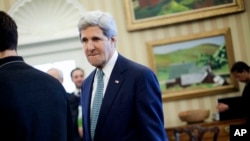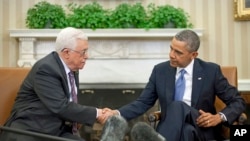Virtually nothing is known about a framework Mideast peace deal U.S. Secretary of State John Kerry is expected to unveil in the coming weeks.
U.S. officials have released very few details about the plan, which they hope can serve as a basis to extend the fragile peace talks between Israeli Prime Minister Benjamin Netanyahu and Palestinian Authority President Mahmoud Abbas.
What has largely gone unmentioned, is that the deal will almost certainly ignore Gaza, a narrow and densely populated strip of land that is crucial for any comprehensive Israeli-Palestinian peace deal.
U.S. negotiators have little choice. Gaza is ruled by Hamas, a hardline Islamist group that firmly rejects negotiating with Israel and is listed by the U.S. State Department as a terrorist organization.
In a telephone interview with VOA, Hamas spokeswoman Israa al-Modallal slammed the talks. She said she thinks Abbas, a longtime Hamas rival based in the West Bank, will achieve nothing for the Palestinian people.
"We didn't ask him to go and speak in our name. And this is a big mistake that Mahmoud Abbas did," she said. "So Kerry's project, we are against it 100 percent, and we say that we want it to stop today."
Gaza Strip key to negotiated settlement
Without Gaza, many analysts think there is little chance the talks can lead to a negotiated settlement to the decades-old conflict or help create a viable and independent Palestinian state.
But U.S. officials are pushing forward anyway. In December, President Barack Obama said that if a "pathway to peace" can be created in the West Bank, "that's something that the young people of Gaza are going to want."
Stephen Zunes, a professor of Middle East studies at the University of San Francisco, agrees that Hamas may feel pressured to make compromises if "a viable Palestinian state at peace with Israel can thrive on the West Bank."
"If [Palestinians in Gaza] can look to the West Bank as an alternative, it will encourage the moderate forces and then could force the more hard-line elements of Hamas aside and lead to Palestinian reconciliation as part of a new viable state," he said in an interview with VOA.
But some are not convinced the strategy will succeed, mainly because Israel is not likely to agree to the level of concessions needed to satisfy Gazans.
Lisa Goldman, director of the Israel-Palestine Initiative at the New York-based New America Foundation, said it is unrealistic to assume that Gazans, most of whom trace their heritage to areas inside what is now Israel, would be enticed by any framework deal.
"I really don't see how that could be a realistic scenario. Gaza is 80 percent refugees right now. And they don't come from the West Bank, they come from Israel proper and they're still living in refugee camps," she told VOA. "So if the framework doesn't include any kind of nod toward the rights of the refugees and the resettling of the refugees, then it simply doesn't speak for the Gazan people."
Israelis, Palestinians hold fast to bedrock positions
Israeli leaders have long insisted that those who fled or were forced out of what is now Israel during the country's creation in 1948 will never be allowed to return, fearing this would challenge the Jewish nature of their state. Sixty-six years later, Palestinian activists say the refugee issue remains the single most important unresolved aspect of the conflict.
But Palestinians are also upset at Israel's other restrictions on Gaza. Israel currently controls almost all of Gaza's borders (except for the Egyptian side), as well as its airspace and its Mediterranean coastline. It also tightly enforces what the impoverished territory can import and export.
Gazans say the blockade represents collective punishment and has helped create what many Palestinians call the world's "largest open-air prison." Many in Gaza struggle to secure basic goods, such as food, fuel and building materials. Joblessness is also a problem. The most recent figures suggest unemployment stands at a staggering 39 percent.
Samer Badawi, a Palestinian-American writer and Middle East analyst, told VOA that under such conditions, Palestinians have little choice but to stick with Hamas, whom they elected in 2006.
"Where the United States and indeed Israel hope that an alternative to Hamas will come from, it is simply not possible when every one of the 1.7 million Palestinians in Gaza is suffocating. So in order to create an alternative to Hamas, you have to give people the freedom to seek out that alternative," he said.
Security concerns a major factor
But Israel insists security concerns keep it from loosening the restrictions. Those concerns were highlighted earlier this month by the dozens of rockets that were fired into Israeli territory from Gaza, all of which were either intercepted by Israel's Iron Dome defense system or landed without injuring anyone.
Israel responded with a series of air strikes on what it said were terrorist sites in Gaza. The increased violence has threatened to unravel the already shaky peace talks, which, without an extension, are set to expire at the end of April.
While the expectations are low that the negotiations will succeed, many analysts say the risks of even more violence are high if the talks break down.
Zunes said it is becoming clear that the talks may represent "the last best hope for peace" and a two-state solution. He warns that a collapse in the talks could further empower those calling for a single state solution, who he said are "gaining in ascendancy."
"And combined with the growth of the illegal Israeli settlements in the West Bank, the demographics are making it much less likely that a viable two-state solution will emerge," he said.
U.S. officials have released very few details about the plan, which they hope can serve as a basis to extend the fragile peace talks between Israeli Prime Minister Benjamin Netanyahu and Palestinian Authority President Mahmoud Abbas.
What has largely gone unmentioned, is that the deal will almost certainly ignore Gaza, a narrow and densely populated strip of land that is crucial for any comprehensive Israeli-Palestinian peace deal.
U.S. negotiators have little choice. Gaza is ruled by Hamas, a hardline Islamist group that firmly rejects negotiating with Israel and is listed by the U.S. State Department as a terrorist organization.
In a telephone interview with VOA, Hamas spokeswoman Israa al-Modallal slammed the talks. She said she thinks Abbas, a longtime Hamas rival based in the West Bank, will achieve nothing for the Palestinian people.
"We didn't ask him to go and speak in our name. And this is a big mistake that Mahmoud Abbas did," she said. "So Kerry's project, we are against it 100 percent, and we say that we want it to stop today."
Gaza Strip key to negotiated settlement
Without Gaza, many analysts think there is little chance the talks can lead to a negotiated settlement to the decades-old conflict or help create a viable and independent Palestinian state.
But U.S. officials are pushing forward anyway. In December, President Barack Obama said that if a "pathway to peace" can be created in the West Bank, "that's something that the young people of Gaza are going to want."
Stephen Zunes, a professor of Middle East studies at the University of San Francisco, agrees that Hamas may feel pressured to make compromises if "a viable Palestinian state at peace with Israel can thrive on the West Bank."
"If [Palestinians in Gaza] can look to the West Bank as an alternative, it will encourage the moderate forces and then could force the more hard-line elements of Hamas aside and lead to Palestinian reconciliation as part of a new viable state," he said in an interview with VOA.
But some are not convinced the strategy will succeed, mainly because Israel is not likely to agree to the level of concessions needed to satisfy Gazans.
Lisa Goldman, director of the Israel-Palestine Initiative at the New York-based New America Foundation, said it is unrealistic to assume that Gazans, most of whom trace their heritage to areas inside what is now Israel, would be enticed by any framework deal.
"I really don't see how that could be a realistic scenario. Gaza is 80 percent refugees right now. And they don't come from the West Bank, they come from Israel proper and they're still living in refugee camps," she told VOA. "So if the framework doesn't include any kind of nod toward the rights of the refugees and the resettling of the refugees, then it simply doesn't speak for the Gazan people."
Israelis, Palestinians hold fast to bedrock positions
Israeli leaders have long insisted that those who fled or were forced out of what is now Israel during the country's creation in 1948 will never be allowed to return, fearing this would challenge the Jewish nature of their state. Sixty-six years later, Palestinian activists say the refugee issue remains the single most important unresolved aspect of the conflict.
But Palestinians are also upset at Israel's other restrictions on Gaza. Israel currently controls almost all of Gaza's borders (except for the Egyptian side), as well as its airspace and its Mediterranean coastline. It also tightly enforces what the impoverished territory can import and export.
Gazans say the blockade represents collective punishment and has helped create what many Palestinians call the world's "largest open-air prison." Many in Gaza struggle to secure basic goods, such as food, fuel and building materials. Joblessness is also a problem. The most recent figures suggest unemployment stands at a staggering 39 percent.
Samer Badawi, a Palestinian-American writer and Middle East analyst, told VOA that under such conditions, Palestinians have little choice but to stick with Hamas, whom they elected in 2006.
"Where the United States and indeed Israel hope that an alternative to Hamas will come from, it is simply not possible when every one of the 1.7 million Palestinians in Gaza is suffocating. So in order to create an alternative to Hamas, you have to give people the freedom to seek out that alternative," he said.
Security concerns a major factor
But Israel insists security concerns keep it from loosening the restrictions. Those concerns were highlighted earlier this month by the dozens of rockets that were fired into Israeli territory from Gaza, all of which were either intercepted by Israel's Iron Dome defense system or landed without injuring anyone.
Israel responded with a series of air strikes on what it said were terrorist sites in Gaza. The increased violence has threatened to unravel the already shaky peace talks, which, without an extension, are set to expire at the end of April.
While the expectations are low that the negotiations will succeed, many analysts say the risks of even more violence are high if the talks break down.
Zunes said it is becoming clear that the talks may represent "the last best hope for peace" and a two-state solution. He warns that a collapse in the talks could further empower those calling for a single state solution, who he said are "gaining in ascendancy."
"And combined with the growth of the illegal Israeli settlements in the West Bank, the demographics are making it much less likely that a viable two-state solution will emerge," he said.





